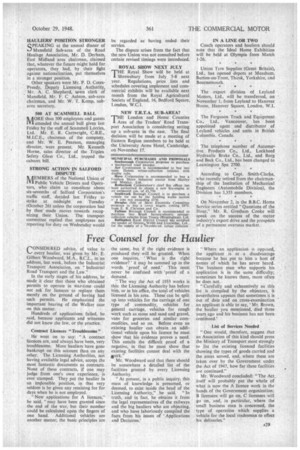Free
Page 31

If you've noticed an error in this article please click here to report it so we can fix it.
Counsel for the Haulier
CONSIDERED advice, of value to every haulier, was given by Mr. E. Gilbert Woodward, M.A., B.C.L., in an address, last week, before the Industrial Transport Association, on " Industrial Road Transport and the Law."
In the early stages of his address, he made it clear that those who obtained permits to operate in war-time could not ask for licences to replace them merely on the ground of having had such permits. He emphasized the important bearing of the Walker case on this matter.
Hundreds of applications failed, he said, because applicants and witnesses did not know the law, or the practice.
Contract Licences "Troublesome"
He went on to say: "A contract licences are, and always have been, very troublesome. More hauliers have gone bankrupt on this account than on any other. The Licensing Authorities, not having available legal advice, accept the most fantastic documents as contracts. None of these contracts, if one may judge from one's own experience, is ever stamped. They put the haulier in an inVossible position, in that very seldom is he given any retaining fee for days when he is not employed.
New applications for A licences," he said, "may have been granted since the end of the war, but their number could be calculated upon the fingers of one hand. Additional vehicles are another matter; the basic principles are the same, but if the right evidence is produced they will be granted. When one inquires, What is the right evidence?' it may be summed up in the words 'proof of need.' This must never be confused with 'proof of a demand. " The way the Act of 1933 works is this: the Licensing Authority has before him, or in his office, the total of vehicles licensed in his area. Thesdcan be split up into vehicles for the carriage of one type of commodity, vehicles for general carriage, vehicles for rough work such as stone and sand and gravel, vans for groceries and similar commodities, and so on. Before even an existing haulier can obtain an additional vehicle upon his licence he must SbOW that his evidence proves a need. This entails the difficult proof of a negative, in that he must show that existing facilities cannot deal with the fork."
Mr. Woodward said that there should be somewhere a detailed list of the facilities granted by every Licensing Authority.
"At present, in a public inquiry, this mass of knowledge is presumed, or deemed, to exist inside the head of the Licensing Authority," he said. "In truth, and in fact, he obtains it from the legal representatives of the railways and the big hauliers who are objecting, and who have laboriously compiled the facts from his issues of 'Applications and Decisions.'
"Where an application is opposed, at a
the applicant is disadvantage because he has put to him a host of names of which he has never heard. business m
The businan who supports his application is in the same difficulty; sometimes he knows them, tnore often he does not.
"Carefully and exhaustively as this list is cbmpiled by the objectors, it pears nevertheless appears that sometimes it is out of date and on cross-examination
say, ' say, ' an applicant is able to Mr. Brown, the haulier you mentioned, died three years ago and his business has not been cootinued.'
List of Services Needed " One would, therefore, suggest that an Association of this kind should press the Ministry of Transport most strongly to list the existing licensed facilities showing the types of goods carried and the areas served, and, where these are taken over by the Government under the Act of 1947, how far these facilities are continued." •
Mr. Woodward concluded: "The Act itself will probably put the whole of what is now the A licence work in the hands of the Government organization; B licensees will go on, C licensees will go on, and, in particular, where the small business man is concerned, the type of operation which supplies a vehicle for the local tradesman to effect his deliveries." , his deliveries." ,




















































































